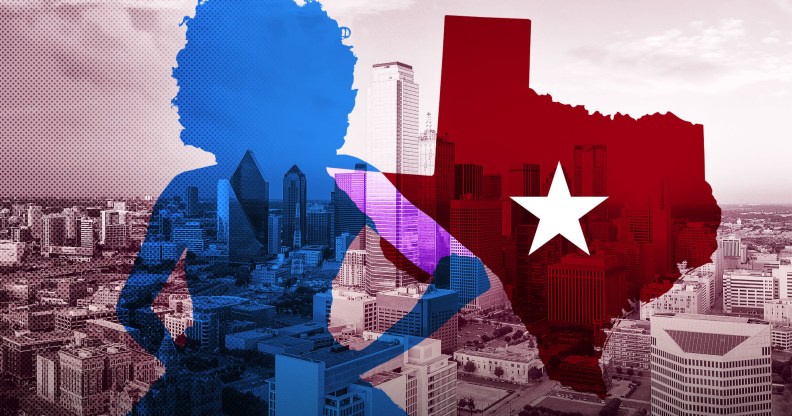This Texan drag queen exposed the glaring flaw in proposals to criminalise drag performers

Texas has been hit by a swathe of anti-drag bills. (Getty)
A non-binary drag performer has eloquently highlighted a glaring hole in the logic of Texas’ proposed anti-drag legislation.
Austin-based queen Brigitte Bandit addressed the Senate at Texas’s State Capitol on 24 March, testifying against the state’s SB12 and SB1601 bills.
Senate Bill 12 seeks to restrict “sexually oriented performances” in front of children on public property, with venues liable to pay a $10,000 fine if they are found to break the law.
According to the bill, “sexually oriented performances” include “a male performer exhibiting as female” or a “female performer exhibiting as male” while singing, lip syncing or dancing.
Senate Bill 1601, meanwhile, threatens to strip funding from district libraries who host events “at which a man presenting as a woman or a woman presenting as a man reads a book or a story to a minor for entertainment”.
In their testimony, Brigitte Bandit explained why focussing on the sex of the drag performer is entirely redundant, emphasising that, under the bills’ current wording, they would be able to continue their performances as normal.
“These bills discriminate against people based on sex and not the actual content of performances,” they began.
“The only reason this bill would affect me is that most people assume I am male under this costume, and I receive the same kind of treatment as any other drag queen.
“However, the bill would not directly affect me. The way it currently defines drag – as I am someone who is born female and does drag as a feminine person – why should I be able to continue the same kinds of events, with similar content and costumes, but not my male counterparts?”
Brigitte Bandit also shared that before becoming a drag queen, most of her jobs involved working with children in Texas, including teaching summer art camps, hosting children’s birthday parties and being a youth group leader at her local church.
“Today, I am a full time drag queen, right here in Austin, where I occasionally host Drag Queen Story Times,” she told the Sentate. “These kinds of events don’t differ much from the kind of work I did before, yet these laws would impact my ability to work with children simply because of how I am presenting, and not actually what I am presenting.
“This bill should be more concerned about the content of the performances rather than the sex or gender of the performers.”
As of right now, the anti-drag bills in Texas are still advancing through the state legislature.
She also highlighted something that many other drag performers have shared in the face of legislative attacks on drag – while some performances are inappropriate for children, most aren’t, and drag performers know how to modify their art form.
“None of us want to have children at our drag shows at the gay bar at 11pm on a Friday night,” they said. “Drag is simply a form of art and like any form of art, it can be produced by many different types of people, and be modified for different kinds of audiences.”
Drag Race UK winner The Vivienne echoed this point after recently making the finale of ITV’s Dancing On Ice.
“I’m not delusional,” Vivienne told PinkNews. “Would I bring a child to my comedy show? No.
“Would I let a child watch me on Dancing on Ice? Yes, because I know how to edit myself, and I know what is appropriate for a family TV show.”

